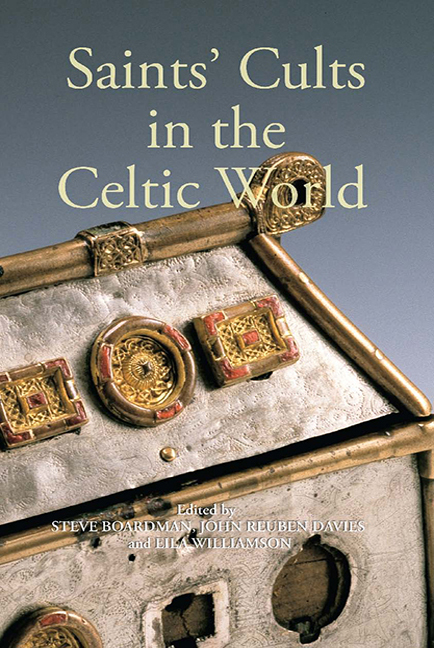Book contents
- Frontmatter
- Contents
- List of Illustrations
- List of Contributors
- Abbreviations
- Editors’ Preface
- 1 Rochester, Hexham and Cennrígmonaid: the movements of St Andrew in Britain, 604–747
- 2 The cults of Saints Patrick and Palladius in early medieval Scotland
- 3 Personal names and the cult of Patrick in eleventh-century Strathclyde and Northumbria
- 4 Bishop Kentigern among the Britons
- 5 Adjacent saints’ dedications and early Celtic History
- 6 Cuthbert the cross-border saint in the twelfth century
- 7 David of Scotland: ‘Vir tam necessarius mundo’
- 8 The cult of Saint George in Scotland
- 9 The cult of the Three Kings of Cologne in Scotland
- 10 The medieval and early modern cult of St Brendan
- General Index
- Miscellaneous Endmatter
9 - The cult of the Three Kings of Cologne in Scotland
Published online by Cambridge University Press: 11 May 2017
- Frontmatter
- Contents
- List of Illustrations
- List of Contributors
- Abbreviations
- Editors’ Preface
- 1 Rochester, Hexham and Cennrígmonaid: the movements of St Andrew in Britain, 604–747
- 2 The cults of Saints Patrick and Palladius in early medieval Scotland
- 3 Personal names and the cult of Patrick in eleventh-century Strathclyde and Northumbria
- 4 Bishop Kentigern among the Britons
- 5 Adjacent saints’ dedications and early Celtic History
- 6 Cuthbert the cross-border saint in the twelfth century
- 7 David of Scotland: ‘Vir tam necessarius mundo’
- 8 The cult of Saint George in Scotland
- 9 The cult of the Three Kings of Cologne in Scotland
- 10 The medieval and early modern cult of St Brendan
- General Index
- Miscellaneous Endmatter
Summary
In Cullen Bay, Banffshire, in the north-east of Scotland there can be seen the rocks known as the Three Kings of Cullen. In an article in 1897, W. Cramond related an older belief that these rocks commemorated a conflict or burial place of three kings from Scotland, Denmark and Norway respectively – a legend of such a conflict had also been mentioned in the New Statistical Account of the parish in the middle of the same century. Nevertheless, both Cramond and Francis Groome, editor of the Ordnance Gazetteer of Scotland, recognised that the rocks were likely to have been named after the Magi or Three Kings of Cologne. Cramond believed that the confusion doubtless occurred owing to ‘the similarity of the word Cullen or Culane to that of Cologne, written “Culane” in the mystery plays …’, as can be seen in examples from fifteenth- and sixteenth-century Scottish records, such as an entry for Epiphany 1512 in the Treasurer's Accounts: ‘offerit to the three Kingis of Culane iij Franch crounis’.
This chapter aims to examine the ways in which medieval and early modern Scots commemorated and expressed devotion to the Three Kings of Cologne – the Magi who visited the infant Christ to present their gifts of gold, frankincense and myrrh. The evidence is diverse, ranging from inscriptions on jewellery to altar dedications, and from literature to historical records of pageantry. Since the cult of the Three Kings is a universal saint's cult, it will be pertinent to examine not only the local and national context of the evidence but also how it compares with evidence of the cult outwith Scotland.
According to legend the relics of the Magi had been acquired in Persia by St Helena, who had transported them to Constantinople. From there they had been translated to the church of St Eustorgius in Milan in the fourth century. They were ‘rediscovered’ during the siege of Milan by the emperor Frederick Barbarossa and then translated to the cathedral of St Peter in Cologne in 1164 by Rainald von Dassel, archbishop of Cologne. A magnificent shrine was made for them between 1190 and 1220 by craftsmen from the workshop of Nicholas of Verdun and other German workshops.
- Type
- Chapter
- Information
- Saints' Cults in the Celtic World , pp. 160 - 179Publisher: Boydell & BrewerPrint publication year: 2009



